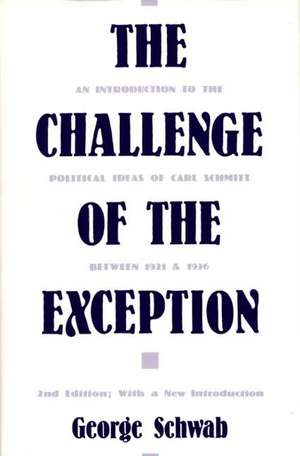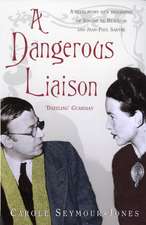The Challenge of the Exception: An Introduction to the Political Ideas of Carl Schmitt Between 1921 and 1936, 2nd Edition: Reference Guides to the State Constitutions of the United States, cartea 248
Autor George Schwaben Limba Engleză Hardback – 30 sep 1989
"The Challenge of the Exception" is the key that unlocked the ideas of Carl Schmitt, a leading political theorist and jurist who influenced the thoughts of, among others, Hannah Arendt, Carl Joachim Friedrich, Otto Kirchheimer, Hans Morgenthau, Franz Neumann, and Leo Strauss. Professor Schwab clearly articulates Schmitt's key concepts and relates their centrality to politics and the state, to the political theory of liberalism, democracy and authoritarianism, and to international relations. When Schwab treats Schmitt's interpretations of constitutional questions, for example, he shows how political theory in Germany is inextricably linked with constitutional law, legal theory, and the country's history.
Not content to merely deal with Schmitt's profound contributions to twentieth-century thought, Schwab devotes considerable space to the unconscionable compromises that he made with the Third Reich. This, however, failed to help him become the political and legal theorist of Hitler's Germany. Schwab shows how the new Schmitt was suspect from the beginning and, by 1936, Schmitt the hunter had become Schmitt the hunted. Schwab's presentation of the multifaceted Carl Schmitt exposes the reader to a truly interdisciplinary excursion into the humanities and social sciences.
Preț: 460.60 lei
Preț vechi: 637.33 lei
-28% Nou
88.15€ • 91.69$ • 72.77£
Carte tipărită la comandă
Livrare economică 12-26 aprilie
Specificații
ISBN-10: 0313272298
Pagini: 189
Dimensiuni: 156 x 234 x 13 mm
Greutate: 0.45 kg
Ediția:W/A New Introd
Editura: Praeger
Seria Reference Guides to the State Constitutions of the United States
Descriere
Not content to merely deal with Schmitt's profound contributions to twentieth-century thought, Schwab devotes considerable space to the unconscionable compromises that he made with the Third Reich. This, however, failed to help him become the political and legal theorist of Hitler's Germany. Schwab shows how the new Schmitt was suspect from the beginning and, by 1936, Schmitt the hunter had become Schmitt the hunted. Schwab's presentation of the multifaceted Carl Schmitt exposes the reader to a truly interdisciplinary excursion into the humanities and social sciences.



















